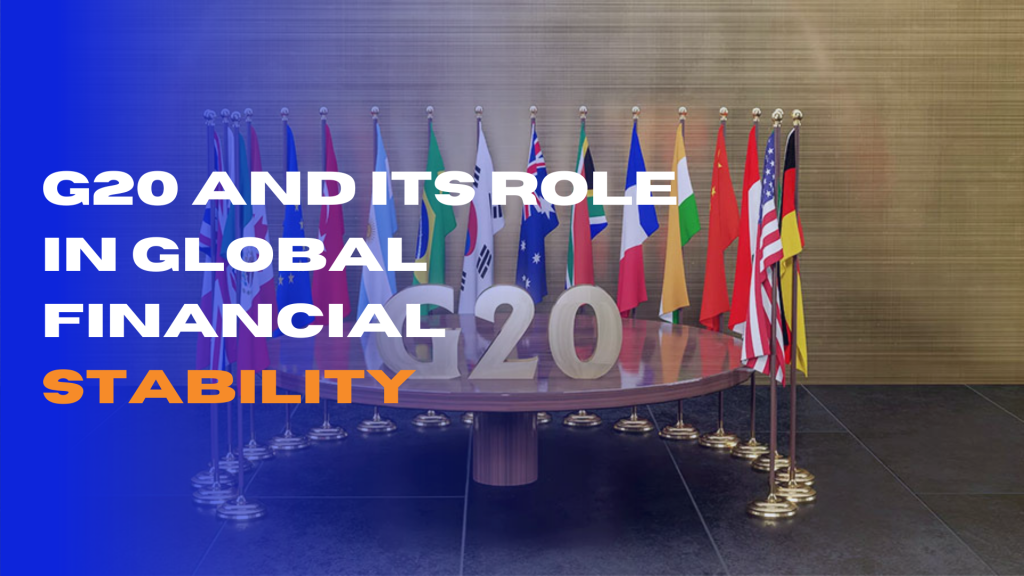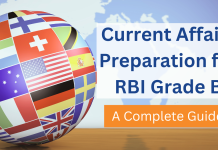The Group of Twenty (G20) is an international organization responsible for ensuring global financial stability. It constitutes a forum bringing 20 largest economies together for discussions and harmonization of policies concerning international economic and financial issues. In this modern era in which economies are closely interrelated, the responsibility of the G20 in terms of ensuring financial stability has gained much more significance than before.
The G20 is a grouping of major economies that plays an important role in the stability of global finance. The G20 countries work together to prevent financial crises, increase the strength of financial institutions, and control markets. Through the alignment of policies, the G20 offers worldwide financial stability. Its function illuminates to readers and students why global cooperation has an impact on global financial stability and economic progress.

What is the G20?
The G20, or Group of Twenty, refers to an international group of the world’s largest economic nations. The G20 was formed in 1999 as a countermeasure to worldwide economic crises and international finance cooperation. Developed countries and developing countries are members of the G20, thus making it a powerful entity when deciding economic policy globally.
List of G20 Countries
The G20 comprises 19 nations and the European Union. They are:
| Developed Countries | Developing & Emerging Countries |
| United States | China |
| Canada | India |
| Germany | Brazil |
| United Kingdom | South Africa |
| France | Mexico |
| Italy | Indonesia |
| Japan | Saudi Arabia |
| Australia | Argentina |
| South Korea | Russia |
| European Union (EU) | Russia |
The G20 accounts for approximately 85% of world GDP, 75% of global trade, and two-thirds of the entire world population. This positions it as a powerful forum for economic decision-making.
The Role of the G20 in Financial Stability Across the World
The G20 plays a central role in promoting financial stability across the world. It focuses on policies that promote economic growth, financial stability, and international development. The following are the key ways in which the G20 promotes financial stability:
1. Economic Policy Coordination
One of the most significant tasks of the G20 is ensuring that countries are in line in economic and financial policies. Since the economies of different countries are interconnected, economic crisis in any country might have an effect on other nations. The G20 provides a platform where world leaders formulate economic strategies and prevent global financial crises.
2. Dealing with Global Financial Crises
The G20 took the forefront in reacting to the 2008 global financial crisis. The group introduced quick steps to stabilize the markets and end economic fall. While making monetary policy decisions, regulating trade, and reform initiatives, the G20 allowed stabilization of the world economy.
3. Consolidation of Financial Institutions
The G20 is closely linked with the significant global financial institutions such as:
- International Monetary Fund (IMF)
- World Bank
- Financial Stability Board (FSB)
These institutions help facilitate the management of the financial risk within the international economy and offer support to nations that are struggling with economic crisis. The G20 helps see that these organizations operate effectively for maintaining financial stability.
4. Managing Financial Markets
Financial markets with no management can lead to crises. The G20 ensures that financial organizations have strict management and regulations for stability. It keeps a sharp eye on:
- Banking regulations to stem fraud and mismanagement.
- Quashing money laundering and corruption.
- Regulation of risky investments that lead to market crashes.
5. Promoting Inclusive Economic Growth
If economic growth needs to be real in its efforts towards financial stability, it must be inclusive. G20 is pursuing policies that:
- Are closing income gaps.
- Promote the creation of jobs.
- Facilitate economies in becoming financially stable.
By enabling the sharing of economic gains among all nations, the G20 helps to make the world economy more stable and balanced.
G20 and Financial Stability: Major Accomplishments
Since its creation, the G20 has passed numerous policies and reforms to ensure the stability of world finance. Below are some of its principal achievements:
| Year | Initiative | Impact on Financial Stability |
| 2008 | Response to Global Financial Crisis | Stabilized world markets, averted economic collapse |
| 2010 | Basel III Banking Reforms | Enhanced banking sector regulations |
| 2015 | Sustainable Development Goals (SDGs) | Prioritized long-term economic stability |
| 2020 | COVID-19 Economic Recovery Plan | Extended financial assistance to distressed countries |
The G20 remains responsive and innovative in addressing emerging financial challenges, making it an essential institution for global financial stability.
Challenges Faced by the G20
Despite its significant contribution, the G20 faces numerous challenges in maintaining financial stability:
- Geopolitical Conflicts – Dispute among major economies (such as the US and China) can potentially affect international trade and financial stability.
- Economic Inequality – While the G20 promotes inclusive growth, income level disparities among countries remain large.
- Climate Change and Financial Risks – Economies are affected by environmental factors, and the G20 must address climate-related financial risks.
- Regulatory Variations – There are different financial regulations in nations, and it is difficult to create one common policy.
Future of the G20 in Financial Stability
In the forthcoming years, the G20 will continue to play an important role in shaping the world’s financial landscape. Future actions can focus on:
- Digital financial security – Safe online payments and protection against cyber attacks.
- Green finance – Supporting investments in eco-friendly industries.
- AI and automation – Determining economic policies in alignment with technology development.
As the global economy continuously transforms, G20 will have to adjust and implement fresh plans so as to achieve economic financial stability for the globe.
Conclusion
The G20 plays a pivotal role in ensuring global financial stability by coordinating economic policies, containing financial crises, and promoting inclusive growth. The G20, through its cooperation with international financial institutions, aims to strengthen financial regulations and prevent market disruptions.
It is critical for finance students and readers to understand the G20’s objective. The world economy is interdependent, and G20’s actions influence economic growth, financial markets, and trade worldwide.
If you are preparing for the IBPS PO exam, ixamBee offers the best resources to help you succeed. Boost your preparation with the IBPS PO Mains mock test, designed to improve accuracy and speed. Enroll in the IBPS RRB PO & Clerk online course for expert guidance and in-depth study materials. For complete banking exam preparation, join the Target Banking Online Course and maximize your chances of success with ixamBee!
At ixamBee, we specialize in providing comprehensive online courses for government exams and online courses for government jobs. Our expertly designed courses for government jobs cater to a wide range of upcoming government exams. Whether you’re preparing for specific courses for government exams or seeking general guidance, ixamBee offers the resources like Beepedia previous year papers, SSC CGL, SSC CHSL, SSC MTS and other mock tests to succeed in exams like RBI Grade B, SEBI Grade A, NABARD Grade A, RRB NTPC, SSC MTS, NIACL Assistant, and more.
Also Read:
The Future of AI Regulations: How Countries Are Adapting
Government Jobs After 12th Class – Check Post, Educational Qualification
List of Wildlife Sanctuaries in India: Discover Nature’s Hidden Gems













